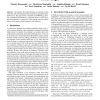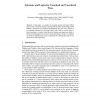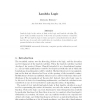JSYML
2010
14 years 8 months ago
2010
We develop several aspects of local and global stability in continuous first order logic. In particular, we study type-definable groups and genericity.
102
click to vote
APAL
2002
15 years 1 months ago
2002
The paper introduces a semantics for the language of classical first order logic supplemented with the additional operators and . This semantics understands formulas as tasks. An ...
107
click to vote
ECAI
2010
Springer
15 years 3 months ago
2010
Springer
We introduce First Order ProbLog, an extension of first order logic with soft constraints where formulas are guarded by probabilistic facts. The paper defines a semantics for FOPro...
113
click to vote
IJCAI
1989
15 years 3 months ago
1989
We Imbed Into a first order logic a representation language that combines atemporal knowledge with time stamps in a hierarchical fashion. Each time structure contains its own chro...
108
click to vote
KDD
1995
ACM
15 years 5 months ago
1995
ACM
This paper introduces a newalgorithm called SIAO1 for learning first order logic rules withgenetic algorithms. SIAO1uses the covering principle developed in AQwhereseed examplesar...
123
click to vote
CSL
2009
Springer
15 years 6 months ago
2009
Springer
We introduce tree-width for first order formulae , fotw(). We show that computing fotw is fixed-parameter tractable with parameter fotw. Moreover, we show that on classes of formul...
102
click to vote
RTA
2005
Springer
15 years 7 months ago
2005
Springer
In this paper, we consider the monadic second order logic (MSO) and two of its extensions, namely Counting MSO (CMSO) and Presburger MSO (PMSO), interpreted over unranked and unord...
CSL
2005
Springer
15 years 7 months ago
2005
Springer
We study the complexity of model-checking for the fixpoint extension of Hintikka and Sandu’s independence-friendly logic. We show that this logic captures ExpTime; and by embedd...
114
click to vote
CADE
2004
Springer
16 years 2 months ago
2004
Springer
Lambda logic is the union of first order logic and lambda calculus. We prove basic metatheorems for both total and partial versions of lambda logic. We use lambda logic to state a...



